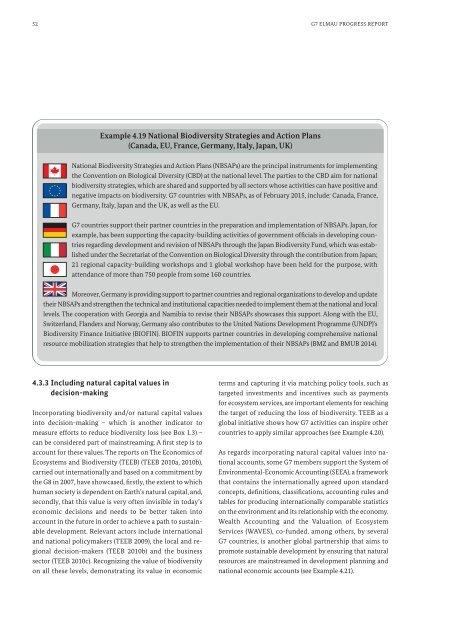G7-Elmau-Progress-Report-2015-Biodiversity-A-vital-foundation-for-sustainable-development
G7-Elmau-Progress-Report-2015-Biodiversity-A-vital-foundation-for-sustainable-development
G7-Elmau-Progress-Report-2015-Biodiversity-A-vital-foundation-for-sustainable-development
You also want an ePaper? Increase the reach of your titles
YUMPU automatically turns print PDFs into web optimized ePapers that Google loves.
52 <strong>G7</strong> ELMAU PROGRESS REPORTExample 4.19 National <strong>Biodiversity</strong> Strategies and Action Plans(Canada, EU, France, Germany, Italy, Japan, UK)National <strong>Biodiversity</strong> Strategies and Action Plans (NBSAPs) are the principal instruments <strong>for</strong> implementingthe Convention on Biological Diversity (CBD) at the national level. The parties to the CBD aim <strong>for</strong> nationalbiodiversity strategies, which are shared and supported by all sectors whose activities can have positive andnegative impacts on biodiversity. <strong>G7</strong> countries with NBSAPs, as of February <strong>2015</strong>, include: Canada, France,Germany, Italy, Japan and the UK, as well as the EU.<strong>G7</strong> countries support their partner countries in the preparation and implementation of NBSAPs. Japan, <strong>for</strong>example, has been supporting the capacity-building activities of government officials in developing countriesregarding <strong>development</strong> and revision of NBSAPs through the Japan <strong>Biodiversity</strong> Fund, which was establishedunder the Secretariat of the Convention on Biological Diversity through the contribution from Japan;21 regional capacity-building workshops and 1 global workshop have been held <strong>for</strong> the purpose, withattendance of more than 750 people from some 160 countries.Moreover, Germany is providing support to partner countries and regional organizations to develop and updatetheir NBSAPs and strengthen the technical and institutional capacities needed to implement them at the national and locallevels. The cooperation with Georgia and Namibia to revise their NBSAPs showcases this support. Along with the EU,Switzerland, Flanders and Norway, Germany also contributes to the United Nations Development Programme (UNDP)’s<strong>Biodiversity</strong> Finance Initiative (BIOFIN). BIOFIN supports partner countries in developing comprehensive nationalresource mobilization strategies that help to strengthen the implementation of their NBSAPs (BMZ and BMUB 2014).4.3.3 Including natural capital values indecision-makingIncorporating biodiversity and/or natural capital valuesinto decision-making – which is another indicator tomeasure ef<strong>for</strong>ts to reduce biodiversity loss (see Box 1.3) –can be considered part of mainstreaming. A first step is toaccount <strong>for</strong> these values. The reports on The Economics ofEcosystems and <strong>Biodiversity</strong> (TEEB) (TEEB 2010a, 2010b),carried out internationally and based on a commitment bythe G8 in 2007, have showcased, firstly, the extent to whichhuman society is dependent on Earth’s natural capital, and,secondly, that this value is very often invisible in today’seconomic decisions and needs to be better taken intoaccount in the future in order to achieve a path to <strong>sustainable</strong><strong>development</strong>. Relevant actors include internationaland national policymakers (TEEB 2009), the local and regionaldecision-makers (TEEB 2010b) and the businesssector (TEEB 2010c). Recognizing the value of biodiversityon all these levels, demonstrating its value in economicterms and capturing it via matching policy tools, such astargeted investments and incentives such as payments<strong>for</strong> ecosystem services, are important elements <strong>for</strong> reachingthe target of reducing the loss of biodiversity. TEEB as aglobal initiative shows how <strong>G7</strong> activities can inspire othercountries to apply similar approaches (see Example 4.20).As regards incorporating natural capital values into nationalaccounts, some <strong>G7</strong> members support the System ofEnvironmental-Economic Accounting (SEEA), a frameworkthat contains the internationally agreed upon standardconcepts, definitions, classifications, accounting rules andtables <strong>for</strong> producing internationally comparable statisticson the environment and its relationship with the economy.Wealth Accounting and the Valuation of EcosystemServices (WAVES), co-funded, among others, by several<strong>G7</strong> countries, is another global partnership that aims topromote <strong>sustainable</strong> <strong>development</strong> by ensuring that naturalresources are mainstreamed in <strong>development</strong> planning andnational economic accounts (see Example 4.21).


